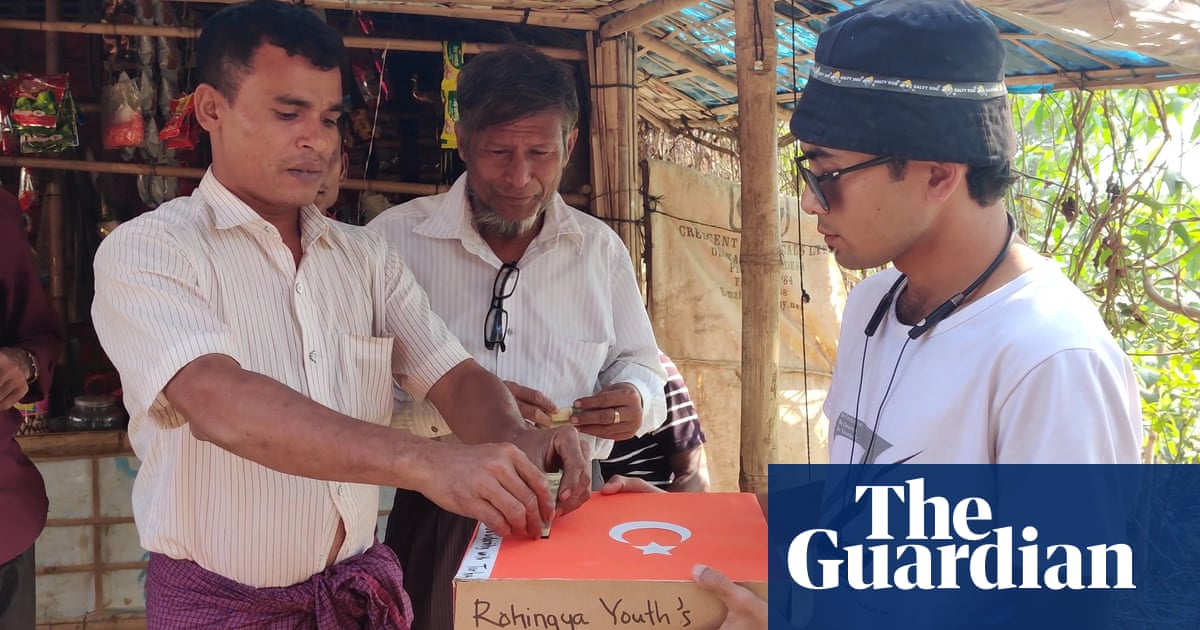
The Scottish-Chinese actor Marli Siu appears out of nowhere, calls my name, and hugs me. We’re in Camden, north London, near to where Siu lives. We’d agreed to meet at a Kurdish café she loves but it’s closed for the holidays – “good for them!” we agree – so she takes me to a pub nearby instead. On the way to our meeting, Siu’s Uber driver had been angry, clearly not having a good day, and the experience had taken it out of Siu. “I was just going to have a tea,” she tells me. “But now I’m like, I need a beer!”
We’re meeting to discuss the BBC adaptation of Dolly Alderton’s bestselling memoir Everything I Know About Love, in which Siu stars. The series follows 24-year-old Maggie and the three friends with whom she shares a house – also in Camden – where debauchery, female friendship and a lot of growing up take place. Siu plays Nell, one of Maggie’s friends, a teacher in a stable-seeming relationship who takes on the role of advice giver, until things become clear that all is not what it seems.
Siu has been working solidly as an actor for years, mixing theatre with film and television work. You might have seen her on a “stars of tomorrow” list (she’s been on several). Her theatrical work has been acclaimed and award-nominated (she most recently appeared in The Ocean at the End of the Lane, at the National). And she’s starred in three feature films, including an intense, engaging performance as a pregnant teenager in Run, by Scottish director Scott Graham, for which she won Best Actress at Bafta Scotland last year.
But Everything I Know About Love feels different – that it might be something like a big break. Siu had bought the book in a bookshop trawl just before one of the lockdowns – her friends were fans – and she says there was an excitement in the air during the shoot. “They built the set – our living room, our kitchen, our bedrooms – and to me it felt quite iconic. It felt like: ‘This is our house, this is the girls’ house.’” The series was put together quickly, on a tight turnaround, and is still being edited for release when we meet. “I got a memory today on my phone,” Siu says, explaining how quickly the production moved. “You know, when it goes, ‘This photo was taken a year ago.’ And it was the tape I did with my friend for the first audition…”
I ask if her life is anything like the one she portrays on screen. Not really, she says, though: “The show is set in your early 20s, [a period that] for me, and I think for a lot of people, was really hard.” At the beginning of her career, Siu commuted by bus to London from her Scottish home for auditions. When she won her first parts, in 2016, she moved into a “chaos house” in Walthamstow, east London. “I got offered a role on a Friday,” she recalls, “and as I stayed at my friend’s over the weekend, I got on [flatshare website] SpareRoom. A friend from Scotland was looking for a place as well – she was doing an unpaid internship, so she had no money – and by Monday I’d found us a flat, a nine-bedroom house, as in very illegal.”
In Scotland, “Everyone was white,” she continues, “so being Asian was different. But in this house, my friend, who is half-Spanish, was the whitest person there. Suddenly, for instance, I could speak to the Thai girl downstairs about cooking. In London you can be from anywhere and feel like you’re from there.” She later discovered that one of her housemates dealt drugs, and because so many people came in and out of the house, things started disappearing. The doors were eventually padlocked, so Siu would carry a screwdriver around with her in case she forgot her keys. “At the time, I was like, ‘This is London living!’” she says. “I was just so excited.”
The daughter of a Scottish mother and a Chinese father, Siu lived in Hong Kong until she was four, then grew up in Forres, a town in north Scotland, with her mother and four sisters. The way she describes it, Siu’s early life was bucolic. The memories she has of Hong Kong are of “little things – the food, the markets, how I was always barefoot, me and my sisters would play outside a lot”. The family lived on Lamma Island, off Hong Kong “which is quite hippy”. (Siu describes her mother as “like a big hippy”.) “Hong Kong island is so different, fast-paced, full of massive buildings. Lamma was a bit more slow paced. I wish I could go back more. Once we moved to Scotland, we were too little, and my mum had the rest of my sisters, so she couldn’t really take us back. But the memories I do have of it are happy.”
In Scotland, Siu enjoyed art and dance classes, but it wasn’t until she came across a local drama group, at 15, that she discovered acting. “I didn’t know it was a job, no one in my family did it. In high school I thought I wanted to go to art school and I went to an open day and ended up in the film department and asked where they got the actors from. Once I went to uni and started doing student short films, I was like, ‘This is what I want to do.’”
Siu’s mother always rented homes, and the family moved around a lot, without changing schools. “We always lived quite far out from where the town was,” Siu recalls. “It was funny how when I was younger I totally depended on my mum. If you had a night out, there was no taxi – my mum would come in her nighty and be like: ‘You’d better be out by 11pm on the dot or I’m coming in!’ It was a lovely childhood, but sometimes I think I’ve not got the best social skills, or I get tired from socialising fast, because we grew up in such remote places.”
It all sounds a bit Little Women, I say. She laughs: “That’s so true! And we used to put on plays. My big sister would not do them, but my younger sisters and my cousins would. So I’d write them and I’d make them do dances, and… I can’t remember what they were about but they always followed the same structure where one of my sisters was always the baddie and one of my cousins was always the princess.”
Has she kept the plays?
“I had a notebook where I wrote them down, but we moved so much that I don’t know where a lot of things are. I think that because of this mixture of being mixed race and moving so much, and also because my mum lives in a different part of Scotland now, there was definitely an element of feeling rootless, and not really knowing where I came from for quite a long time.”
Throughout our time together, Siu repeats that she has been talking through similar issues with her sister or friends who are also actors and people of colour. Growing up in a very white environment, she hadn’t given much thought to the fact that she’s half Chinese until she started acting. “You never see yourself in a box as a human, in general, but within the acting industry they need to have you in boxes, and suddenly it’s kind of forced upon you to think about that.” She worried about getting work because she hadn’t seen a lot of people who looked like her on screen. She considered changing her surname at first, into a Western one, though she’s glad she didn’t. “You’re young and impressionable and you just want to do well,” she says, by way of explanation. “I grew up with not a lot of representation on screen, and around a lot of white people, so there wasn’t really a role model for me to aspire to.”
That links to another anxiety: “I worry talking about this, because there are [Asian] actors that came before me, whom the industry was so much harder for. And black actors who have fought for space in this industry… They’re the only reason there are parts for people like me.” Siu finds it hard to discuss topics like this, “because sometimes the honest truth is that it’s not always that much better. Sometimes you just feel really angry at the industry, and you never want to come across as angry or bitter, so I try and focus on where we’ve got to, but there’s so much further it needs to go.”
It has been crucial for her in the past to read about other actors’ experiences. “Interviews I’ve read with Asian actors or black actors talking about the struggles, what it was like working in this industry, I’ve saved them.” It meant a lot, she says, to have someone else “co-sign” your experience. “Then you’re like: oh, I’m not mad.”
It has helped to live in London and find other people who are experiencing similar things. In a recent conversation with an actor who is also Asian and biracial (a talk that felt “healing”, Siu says), they shared experiences in which casting directors had tried to draw on their faces. “Her casting director told her to come in with ‘more Asian-shaped eyes’,” Siu says. “And mine, in the room, she was like, ‘You don’t look that Chinese.’ I said, ‘Well, I’m mixed race.’ And she was like, ‘Well, do you have any makeup to make your eyes look more Asian?’” Her gut reaction in these situations has been to laugh, and it is only later that the experience sinks in. Siu told the casting director that she didn’t have any makeup with her, “and she said, ‘I’ve got eyeliner. I’ll do it.’ I was like, Oh my God! Is this woman going to draw on my face? Luckily, she couldn’t find any.”
Siu is in her late 20s. “There’s no point doing an interview and trying to come across like I’ve got here really easy,” she says. “It’s not helpful to anyone to airbrush your experience.” She mentions, several times, that the fact that this interview is happening now and not sooner in her career is partly due to the fact that she has reached a point where she can afford a publicist. “I went to uni and spent six years working to make enough money to get to this place – and to get good enough [at the craft.] It takes the time it takes.”
Siu says she’s now really enjoying life – doing good work, with a good community of friends, and can go out and buy nice drinks, and afford to go on holiday. Is she ready for it all to change if Everything I Know About Love becomes a hit? She shrugs. “I think I’ve had so many jobs where my friends have been like” – she mock-gasps, mimicking her friends imagining her impending stardom – “and then that never happens. And even that term, ‘famous’, that’s so weird. I don’t know if I’m being naive. My hope is that people like it – and that I’ll get loads more auditions.”












